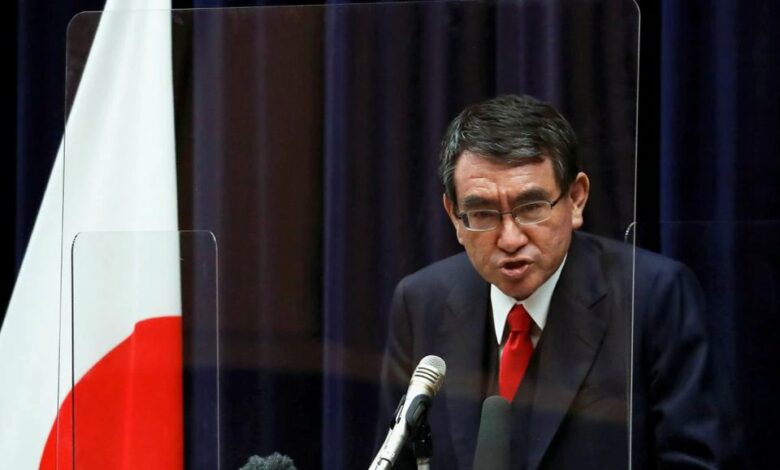
TOKYO, Sept 6 (Reuters) – Taro Kono, Japan’s minister in charge of fighting COVID-19 and a top choice of voters for Japanese prime minister, may also pick up the backing of a popular ruling party heavyweight in the race for party leader, broadcaster TV Asahi said on Monday.
Prime Minister Yoshihide Suga’s shock Friday announcement he was stepping down has thrown a ruling Liberal Democratic Party (LDP) leadership race set for Sept. 29 wide open, with an array of candidates – including two women – considering runs.
The LDP’s majority in parliament guarantees the winner will become prime minister.
Former foreign minister Fumio Kishida, 64, is the only candidate to throw his hat into the ring so far.
Kono has yet to formally declare his candidacy but media reports say his intention to run is strengthening.
Former defence minister Shigeru Ishiba, who is popular among LDP grassroots members, is considering backing Kono instead of running himself, TV Asahi reported, without citing sources or further details – a move that could significantly increase Kono’s chances of winning.
Kono sidestepped the issue at a Monday news conference on Japan’s vaccination drive, saying only that in the case he did run he would make sure it had no impact on his current duties, including a vaccine rollout in a nation where not quite half have been fully inoculated.
Ishiba, 64, had such strong support among rank-and-file party members in the past that he defeated Suga’s predecessor Shinzo Abe in the first round of a 2012 leadership race. He lost in a later round, when only lawmakers could vote, and has since lost two more leadership contests.
Two public opinion polls over the past few days have said Kono is the top choice of voters to assume the premiership, with 23 percent telling the Yomiuri Shimbun daily in a poll published Monday that they favoured him.
But he was just a hair ahead of Ishiba at 21 percent.
A former foreign and defence minister, the 58-year-old Kono, educated at Georgetown University and a fluent English speaker, has built a popular following among young voters with an active social media presence in two languages and 2.3 million followers on his Japanese page alone.
Kono has long been a favoured candidate among voters for prime minister and has made no secret of wanting the job, but party elders are wary of him for his outspokenness and reputation as a maverick.
Others feel he is still too young for the job, though media reported at the weekend he had secured Suga’s backing.
Kishida was seen as the likely heir when Abe quit last year due to illness, his low-key, soft-spoken style typically lands him low in voter surveys – such as the Yomiuri’s, in which he trailed at only 12 percent.
Unlike last year’s leadership race, when Suga emerged the winner, this time ordinary party members at the prefectural level will also be able to vote, making the outcome harder to predict.
Potential candidates spent a busy weekend meeting with other lawmakers, sounding them out for support, media said. Each needs to gather 20 supporters by Sept 17 to become a formal candidate, with the vote on Sept 29.
Should the results be close, a second round would be held with only lawmakers allowed to vote.
Abe’s actions are being closely watched since he, as Japan’s longest-serving prime minister, still retains influence in the party’s two largest factions and among conservative lawmakers.
Japanese media has reported that Abe will be backing former internal affairs minister Sanae Takaichi, who hopes to become Japan’s first woman prime minister.
But Monday’s Yomiuri survey had Takaichi trailing badly at three percent – just behind Abe himself, at 5 percent.
Additional reporting by Antoni Slodkowski and Ju-min Park; Editing by Michael Perry




